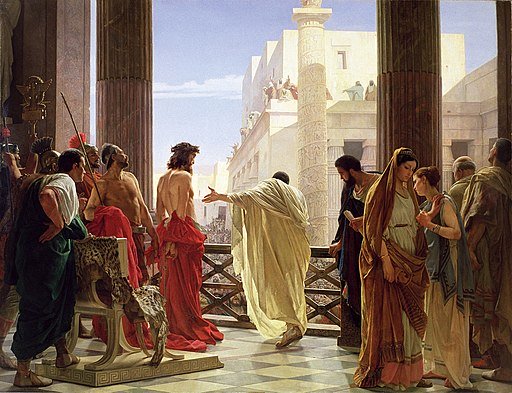CLUELESSNESS AND CALUMNIES AT CALVARY
THE FIVE FIRST SATURDAYS IS A DEVOTION NEEDED NOW MORE THAN EVER! FIND OUT MORE HERE
THE SAINT MICHAEL PRAYER AND THE ROSARY
ARE ALSO POWERFUL PRAYERS TO HELP US THROUGH THESE VERY TURBULENT TIMES!
HIGHLY RECOMMENDED! DELIVERANCE PRAYERS,
A BOOK FROM SENSUS TRADITIONIS PRESS
(A GREAT PUBLISHER HELPING US FIGHT OUR MANY SPIRITUAL BATTLES NOWADAYS)!
CHECK OUT OUR PODCAST PAGE AND OUR YOUTUBE CHANNEL FOR INSPIRING CONTENT
THIS WEBPAGE IS ALSO AVAILABLE
AS A PODCAST HERE
I would like to start this essay with two well known quotations. The first of these are Jesus’ words uttered from the cross as He was suffering His crucifixion:”Father, forgive them for they know not what they do" (Luke 23:34). The second comes from St. Augustine, the one of the church’s greatest theologians from his well-known book Confessions. He wrote of God: “Our hearts are restless until they rest in you”.
I would add a slight addition with no disrespect meant to the great Doctor of Grace, as he is known. Our hearts are not only restless until they find rest in God, might I add many times they are also clueless as to the difference between good and evil without His guidance and grace! As such we human beings have been heaping calumnies on each other for centuries!
There are a few anecdotes from the events of Jesus' Passion, Death, and Resurrection to help illustrate this, from scripture.
We all know that given their limited human knowledge, Christ’s disciples couldn’t comprehend during His earthly ministry, perhaps quite understandably, what our Lord meant when He told them on more than one occasion about how He would be killed and then rise from the dead.
Clearly, neither could Jesus’ enemies fathom His mission! We see this in a striking fashion from the High Priest Caiphas in his own words in Chapter 11 of John's Gospel, in which he gave his assent to Jesus’ execution. You might recall that the members of the Jewish supreme council and tribunal known as the Sanhedrin were in a state of panic after Jesus raised Lazarus from the dead for everyone to see not long before His Passion.
They worried aloud "What are we to do? For this man performs many signs. If we let him go on like this, every one will believe in him, and the Romans will come and destroy both our holy place and our nation." (John 11:47-48)
To which Caiphas responded "You know nothing at all; you do not understand that it is expedient for you that one man should die for the people, and that the whole nation should not perish" (John 11:49-50).
We read in the commentary in the Ignatius Study Bible that “The statement is brimming with historical irony. The Romans did in fact destroy both Jerusalem and its Temple in A.D. 70, not because the Jewish authorities let Jesus continue his ministry in peace, but precisely because they condemned him to a violent death. In the end, it was not the acceptance of Jesus that threatened the city but the rejection of him that made its demise inevitable.”
Clearly, Jesus did not match the Jewish authorities’ expectations of being a Warrior King like King David coming to liberate the Jews from Roman rule. And within a few decades after His Crucifixion, in 66 AD, tensions between Jewish factions and the Roman authorities would erupt into an outright revolt which the Romans would put down brutally four years later.
Our Lord warned the sorrowful women who followed Him as He carried His cross on the road to Calvary "Daughters of Jerusalem, do not weep for me, but weep for yourselves and for your children….For if they do this when the wood is green, what will happen when it is dry?" (Luke 23: 28 and 31).
It’s as if He could see the great Jerusalem Temple in flames and ruin several decades in the future in 70 AD following the Roman conquest and the horrifying defeat of the Jewish revolt that year.
So, one might ask the High Priest Caiphas if we could see him again somehow, “How did that ‘it's better that one man die than a nation should perish’ thing work out?”
While Peter would later say, after Pentecost, addressing the men of Israel, that he understood that they had acted out of ignorance in condemning Jesus to death through His crucifixion, it is also worth noting that both Matthew and Mark in their respective Gospels Mt 27:18 and Mark 15:10 wrote that “It was out of envy” that the chief priests handed Jesus over to the Romans to be crucified.
That’s an important point. It wasn’t just to preserve Jewish traditions they thought were at peril or even, as Caiphas implied, that Jesus' growingly popular ministry would somehow trigger a ferocious assault from mighty Rome against the Jews in Judea.
One might well ask this question of how much envy played a part in their desire to kill Jesus, as opposed to their just taking grave offense at Him on religious grounds thinking of Him as a blasphemer for curing on the Sabbath and calling God His Father among other things! Literally, God only knows the answer to that as only He can see each of our heart’s true desires and the real motives behind our actions.
Nonetheless, Jesus showed His great compassion and mercy while suffering an excruciatingly painful death when he implored His Heavenly Father to forgive those who, having clamored for His crucifixion only hours before, were mocking Him in His agony on the cross,
It’s as if he was taking His own advice he had given in the Sermon on the Mount to all the disciples and others listening that day “Love your enemies and pray for those who persecute you”(Matt 5:44).
The mob, spurred on by the chief priests and elders among the Jewish community as we read in Matthew’s Gospel Chapter 27, verse 10, were actively encouraging the Romans to brutally murder an innocent man, Jesus, on the false charge of his being an insurrectionist and thus a threat to the mighty Roman Empire. So much for the Eighth Commandment forbidding false witness!
And to top it off, the chief priests showed themselves quite ready to overlook their religious principles when the Roman governor, Pontius Pilate, trying to appease the mob asked them “shall I crucify your king?”, as pictured above. Their horrifying response was to cry out “we have no King but Caesar!” (John 19:15) Caesar? As if they pledged their loyalty to one of those many 1st century Roman emperors, in this case Tiberius, flawed individuals if not out and out tyrants, and Gentiles yet, over God!
They could have just as easily said something else like “This man is not our King!” Clearly, their hearts were too hardened to hear God’s voice through His only begotten Son. Clearly they were not following the great inspiration from Psalm 95:7-8 (psalm 94 in the Douay-Rheims Bible) “For he is the Lord our God: and we are the people of his pasture and the sheep of his hand. Today if you shall hear his voice, harden not your hearts.” No doubt about it: sin not only offends God it makes us stupid as well!
The mob, led on by the chief priests and elders, blackmailed Pontius Pilate to get him to cave in and authorize Christ’s crucifixion, saying he would be no friend of Caesar if he let Jesus go. But, as if that weren’t enough…..
Picture for a brief moment Jesus Christ the second person of the Trinity ignominiously nailed to a cross, bleeding from every part of His body, racked with pain literally from head to toe!
And while they may never have gotten the irony, those among the chief priests, scribes, and elders, in their scorn and hatred for this upstart who upbraided them for their hypocrisies, were bringing the first part of Psalm 22, written centuries earlier, to life!
We read in Psalm 22 (21 in the Douay-Rheims Bible) in verses 7 and 8:” All who see me mock me…. they wag their heads; ‘He committed his cause to the LORD; let him deliver him, let him rescue him, for he delights in him!’”
And what did those just mentioned, who mocked Jesus in His crucifixion, say in Matthew’s Gospel in Chapter 27 verses 42-43? “He saved others; he cannot save himself. He is the King of Israel; let him come down now from the cross, and we will believe in him. He trusts in God; let God deliver him now, if he desires him; for he said, 'I am the Son of God.'” There are similar accounts of this opprobrium found in Chapter 23 of Luke’s Gospel and Chapter 15 of Mark’s Gospel.
Yet God the Father did indeed deliver His Son from his seemingly ignominious fate. The tragedy of Jesus' Passion and Crucifixion would be the catalyst for a great triumph for our Lord and for Humanity as a whole, as it opened up the doors of heaven for our salvation! (It is worth noting here as well, that Psalm 22 ends on a triumphant note of praise for God.)
Jesus did indeed “come down from the cross”, when He was taken down, actually, after His death, and He appeared in His risen body to His disciples on several occasions as recorded in scripture.
Also, you’d think that right after Christ’s death “when the earth quaked and the veil of the Jerusalem temple was torn in two from top to bottom” (Matt 27:51), that those bitterly mocking Him might suddenly get a clue about Christ actually being the Son of God?
That when there was “darkness over the whole land” during His actual crucifixion, as recorded in both Luke’s and Mark’s Gospels, possibly from a solar eclipse, they may see these as possible signs of supernatural indignation from God the Father in some way?
Or that when the dead came out of their tombs and appeared to many upon Christ’s Resurrection (John 27:52-53) that those among the chief priests and elders would stop being so willfully blind?
Yet they still would not believe in Him! The chief priests had Pilate send soldiers to seal the heavy stone in front of the tomb, and to guard it. And yet what was their response when they heard the stone had been rolled back somehow? Not to seek out Jesus in some way or find out for themselves about the veracity of His Resurrection.
No, it was to bribe those guards tasked with guarding the sealed tomb to say that Jesus’ disciples had come by night and stolen Him away while they were asleep (Matt 28:11-15)!
Note as well when Jesus cried out the opening verse from Psalm 22 “Eli, Eli, Lama Sabachthani” (which translated means “My God, my God, why have you abandoned me?”) there were some among the jeering spectators who thought He was calling for Elijah! Wrong again!
Although many Jews would indeed be baptized after hearing the good news proclaimed by Peter in the book of Acts (2:41) at Pentecost, tragically, there was still much resistance from the likes of the chief priests, no doubt including Annas and his son-in-law the chief priest Caiphas mentioned earlier.
Their hearts and minds were closed, they were blinded by their arrogance, and they insisted on staying clueless for whatever reasons of envy or hatred.
Clearly these members of the Sanhedrin might not have understood the heinousness of their slander of Jesus, paving the way for His murder. But at some point they, like the rest of humanity, should have repented of their blindness and calumnious cluelessness and seen Jesus for who He truly was, and is.
As we read in Matthew’s Gospel, Ch.27 verse 54, upon our Lord’s death, ”When the centurion and those who were with him, keeping watch over Jesus, saw the earthquake and what took place, they were filled with awe, and said, "Truly this was the Son of God!"
God Bless,
Christopher Castagnoli
for www.ourcatholicprayers.com
FROM OUR BOOK AND GIFT STORE
OR CAFE PRESS STORE!
Return from Cluelessness and Calumnies
to Prayer Blog Page















